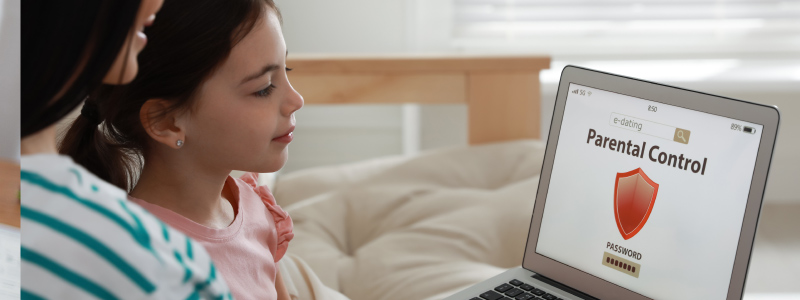Parental control made easy: Top strategies to monitor and restrict internet browsing for your kids

Amanda Morgan

As we navigate the digital age, parental control has become a crucial aspect of child development. The internet offers an expansive world for our young people to explore; however, it also poses risks that can be mitigated with effective parental controls.
In this comprehensive guide, you'll learn how to establish and set parental controls to keep your kids safe online. We will delve into understanding the potential dangers of unrestricted internet browsing and discuss strategies for choosing suitable internet filtering software.
We understand privacy is paramount – so we'll explore methods of monitoring your child's online activity without infringing on their personal space. Finally, we will highlight some free options available for controlling your child's internet browsing experience.
Establishing parental controls: What you need to know
The online world is a rich source of info and amusement, yet it can likewise be an obstacle for little ones. According to Internet Matters, 42% of children have encountered online threats while browsing the internet unsupervised.
To protect your child from these potential dangers, it's time to play the parental control game. But what are the rules?
Understanding parental controls
Parental controls are like the bouncers of the internet, keeping out the riff-raff and protecting your kids. They help filter out inappropriate content, control in-app purchases, manage screen time, and even track location.
Setting up parental controls
- Browsers: Chrome, Firefox, and the gang have got your back. They let you block certain websites or restrict search results.
- Gaming consoles: If your kids are gaming fanatics, consoles like PlayStation or Xbox offer parental control options too. It's like having a referee in the virtual world.
- Social media platforms: Facebook, Instagram, and their buddies provide privacy settings where you can limit who sees your child's profile or posts.
Tips for effective use of parental controls
- Create unique profiles for each family member with different restrictions based on age and maturity level.
- Maintain open communication with your kids about why these measures are necessary.
- Avoid relying solely on these tools; they should complement – not replace – regular discussions about safe online behavior.
Remember that no tool offers complete protection against all types of cyber threats, so educating yourself about digital safety remains paramount.
Key Thought:
Parental controls are like bouncers for the internet, helping filter out inappropriate content and protect kids from online threats. They can be set up on browsers, gaming consoles, and social media platforms to create personalized security measures based on age and maturity level. It's important to maintain open communication with your children about why these controls are necessary and not rely solely on them for protection.
The perils of unrestricted internet browsing for kids
In this digital era, children have the world at their fingertips. But unrestricted internet browsing can expose them to dangers and inappropriate content.
Research suggests that kids spend an average of six hours a day glued to screens, with a good chunk of that time spent browsing the web. And guess what? More screen time means more chances of stumbling upon harmful stuff online.
The online hazards that await
- Cyberbullying: Social media can turn into a playground for cyberbullies, causing emotional distress for kids.
- Online predators: The internet provides a cloak of anonymity for predators who target vulnerable minors.
- Inappropriate content: The web is a treasure trove of adult-oriented material that's definitely not kid-friendly.
- Data privacy issues: Kids might unknowingly spill personal info that could be exploited by online evildoers.
Shielding your child from online threats
To keep your child safe, it's crucial to set up parental controls and closely monitor their online activity. Parental control tools can filter out harmful content and restrict access based on age-appropriateness. You can even block specific websites or categories like violent games or adult sites.
But remember, it's not just about the controls. Educating your child about safe internet practices is equally important. Encourage open conversations about their online experiences so they feel comfortable discussing any issues with you directly.
Choosing the right internet filtering software
84% of parents worry about their kids' online safety. Don't stress, picking the perfect parental control software is easier than you think.
First, figure out what concerns you have. Are they glued to the screen? Visiting sketchy sites? Once you know, finding software to tackle those issues is a breeze.
There are tons of filtering software out there, like Net Nanny, Norton Family, and Qustodio. They offer features like blocking adult content, setting screen time limits, and even tracking location.
- Net Nanny: Get real-time alerts and reports, plus top-notch web-filtering tech that blocks explicit content.
- Norton Family: Keep an eye on multiple devices and browsers, with search and video supervision.
- Qustodio: Advanced Facebook monitoring and the ability to set device use schedules.
There are also free options like KidLogger and Zoodles, but they might not have all the fancy features of the paid versions. Remember, though, no software can replace talking to your kids about safe browsing habits.
Make an informed decision to protect your kids online without cramping their style. Safety first, but let them be creative.

Monitoring your child's internet activity without invading their privacy
Parents seek to protect their children while online, yet also maintain respect for their privacy. According to the Pew Research Center, over 90% of parents believe in finding a balance between control and privacy.
Approximately 7 in 10 adolescents attempt to conceal their digital activities from their guardians. So how can you keep an eye on your child's digital footprint without crossing boundaries?
Talk openly about online safety
Start by having open conversations about online safety. Encourage your kids to share any concerns or uncomfortable experiences they may have.
Set clear boundaries and expectations
Create guidelines for internet usage, including safe sites, screen time limits, and the importance of not sharing personal information.
Use parental control tools wisely
Homelinkd recommends using parental control tools as aids, not spyware. They can help limit access to inappropriate content, manage screen time, and monitor social media interactions without invading your child's autonomy.
Promote digital literacy
Teach your kids not just how technology works, but also how to use it responsibly. Encourage critical thinking skills so they understand the consequences of irresponsible web browsing.
5 Free options for parental control on internet browsing
To ensure our children's safety in the digital age, free tools are available to help us manage their internet usage securely. Luckily, there are free tools that can help you manage their internet usage securely.

Google Family Link
Google Family Link lets you set screen time limits, approve or block apps, and even lock your child's device when it's time for bed or study.
Kaspersky Safe Kids
Kaspersky Safe Kids offers app management, screen time control, and real-time alerts about suspicious activities. Some advanced features require a premium subscription, but the basics are free.
Zoodles Kid Mode
If you want something interactive yet secure for younger kids, Zoodles Kid Mode is an excellent choice. It provides educational games in a kid-friendly browser environment with no chance of accidental exposure to inappropriate content.
Tips For Using These Tools Effectively:
- Educate yourself: Understand how these tools work to use them effectively.
- Maintain open communication: Talk openly with your kids about why these controls are necessary.
- Create balance: Aim for a balance between safety and freedom, avoiding overly restrictive settings.
- Frequent updates: Update settings as your child grows older and their needs change.
Remember, while parental control software helps manage internet browsing, open dialogue and education about online safety are essential.
FAQs
Why is it important to have parental controls?
Parental controls are crucial for protecting children from harmful online content, ensuring they have a safe browsing experience, and managing screen time effectively.
How effective are parental controls?
Studies show that while parental controls aren't foolproof, they significantly reduce exposure to inappropriate content when used correctly.
What are the cons of parental controls?
- They can limit a child's freedom and hinder their ability to learn internet navigation skills.
- There is a potential over-reliance on technology for monitoring rather than open communication.
Why don't parents use parental controls?
The reasons vary – lack of awareness about such tools, technical difficulties in setup, or concerns about invading their child's privacy could be factors.
Conclusion
Establishing parental controls is crucial for keeping your kids safe online. Ensure that you understand the risks and choose the right filtering software for your needs. Find a balance between monitoring and privacy to create a safe online environment.
We hope that this blog has helped to gain an idea of how you can protect your children from harmful content and have peace of mind.










